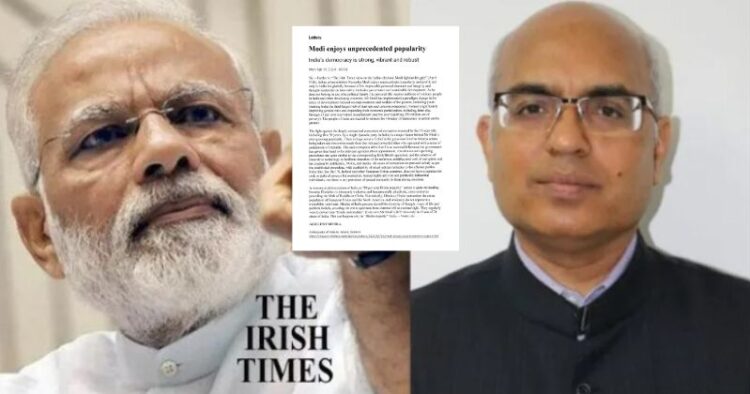In a sharp response to The Irish Times’ recent editorial titled “The Irish Times view on the Indian election: Modi tightens his grip,” Indian Ambassador to Ireland, Akhilesh Mishra, dismissed the allegations as baseless and propagandist.
The editorial, published on Thursday, April 11th, accused Prime Minister Narendra Modi of fostering “intolerant Hindu-first majoritarianism” and tarnishing India’s democratic credentials. It went on to draw parallels between Modi and Turkish Islamist leader Recep Erdogan, alleging that Modi’s embrace of Hindu nationalism has exacerbated anti-Muslim tensions and eroded India’s secular political fabric.
The Irish Times attempted to bolster its argument by highlighting the Delhi liquor scam allegations against Arvind Kejriwal, an opposition leader. It further criticised what it described as the BJP’s populist welfarism, claiming it sustains an intolerant majoritarianism with strong appeal among the poor.
Responding to these allegations, Ambassador Mishra emphasised that all cases of corruption in India are pursued rigorously in accordance with established procedures, with judicial remedies available to affected parties. He refuted the portrayal of India as succumbing to majoritarianism, asserting that such claims undermine the country’s vibrant democracy and pluralistic ethos.
Mishra also underscored the fallacy in equating Modi’s governance with Erdogan’s authoritarianism, highlighting India’s robust democratic institutions and respect for constitutional values.
Ambassador @AkhileshIFS’s rejoinder to @IrishTimes' highly biased & prejudiced editorial [Modi tightens his grip” April 11, 2024)], casting aspersion on Prime Minister of India, Shri @narendramodi, Indian democracy, law enforcement institutions & “Hindu-majority” people of India. pic.twitter.com/Oh5rFly92Z
— India in Ireland (Embassy of India, Dublin) (@IndiainIreland) April 15, 2024
In a statement, Mishra highlighted Modi’s global popularity, citing his “impeccable personal character and integrity” and his leadership on innovative governance and sustainable development. He emphasized that Modi’s rise to prominence without belonging to an elite political family serves as an inspiration to millions of ordinary people in India and beyond.
Mishra credited the Modi government’s crackdown on corruption for the Prime Minister’s popularity, noting that actions taken against corrupt elites have been well-received by the grassroots level. He stressed that all corruption cases are pursued strictly according to established procedures, with judicial remedies available to affected parties.
He criticized The Irish Times for labeling India as an intolerant, Hindu-majority nation, arguing that such characterizations are misleading. Mishra defended Hinduism as inherently inclusive and pluralistic, highlighting the diversity of political beliefs within the Hindu community.
Mishra challenged the notion of India as a monolithic Hindu vote bank, pointing out the country’s vast diversity of thought and political affiliations. He noted that Modi’s Bharatiya Janata Party (BJP) governs in only 12 out of India’s 28 states, illustrating the pluralistic nature of Indian democracy.
Overall, Mishra’s remarks underscored Modi’s global stature, his government’s efforts to combat corruption, and the diversity of India’s political landscape. The statement aimed to refute criticisms of India’s political climate while showcasing Modi’s appeal both domestically and internationally.














Comments